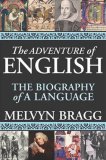Summary | Excerpt | Reviews | Beyond the Book | Readalikes | Genres & Themes | Author Bio

Critics' Opinion:
Readers' Opinion:
First Published:
Sep 2004, 336 pages
Paperback:
Sep 2006, 336 pages
 Book Reviewed by:
Book Reviewed by:
BookBrowse Review Team
Buy This Book
The Vikings had brought their own languages, particularly that of the Danes, but also the language based on the kindred Norwegians. Up to about AD 1000, these were pretty much undifferentiated and known as Old Norse. Deep inside the Danelaw they were attempting to impose this speech as much as they imposed their martial sovereignty. The interesting result was that, apart from the crucial matter of grammar, their success was rather limited. In its later phases, English became a language with an immense capacity to absorb others, to convert others, certainly to take on board other languages without yielding the ground on its own basic vocabulary and meanings. Yet here at this earlier stage — four hundred years later, since the Frisian tribes and others had transported the roots of English into the people who would bear that name — it was still surprisingly obstinate. Only about a score of Celtic words had been admitted; only about two hundred Roman words and, even now, from these overwhelming Danish invaders, no more than about one hundred fifty words were added to a national word-hoard of about twenty-five thousand. This was partly because the power was at Winchester and texts from all around the country were copied into the West Saxon dialect there. But also it is as if at this stage English had dug in so very deeply that it would not be moved. And the result of this obstinacy, in my opinion, made it so powerfully earthed that later, when the Normans came with far more devastating consequences, it could still feed off its deep taproots.
Nevertheless the Vikings — Danes and Norwegians— brought words which enriched the language greatly. In northern parts of England the new invaders' words predominate much more than in the south, exposing the north–south divide; and the accents too, from what linguists tell us —the Yorkshire, the Northumbrian, the Geordie, the Cumbrian — reach back to the sounds of the men in those longships whose peerless shipbuilding crafts enabled them to launch themselves as far as America and into the Mediterranean.
The Vikings live on most strikingly in the place names which spread like a rash over what was the land of the Danelaw. Locally it struck hard and has stayed fast. There are said to be at least one thousand five hundred of these names, more than six hundred of which, for example, end in "-by," the Scandinavian word for farm or town.
I was brought up in the far north-west of England, a few miles outside the Lake District, a place of more than four hundred mountains and thirty-three lakes deeply settled by Norwegian Vikings, most of whom came across from their stronghold in Dublin. The words they brought were bedded into the local dialect for more than a thousand largely undisturbed years. To use "-by" as an example: within a few miles of the town in which I grew up, Wigton, there are Ireby, Thursby, Wiggonby, Corby, Lazenby, Thornby ,Dovenby and Gamblesby; more widely known examples would be Derby, Naseby and Rugby. The "-thorpe" ending, which denotes a village, is seen in Scunthorpe, Althorp, Linthorpe. The "-thwaite" ending, which denotes a portion of land, is again all over the north, and in the Lake District alone you have Bassenthwaite, Ruthwaite, Micklethwaite and Rosthwaite; "-toft," which means a homestead (the site of a house and its outbuildings), can be seen in Lowestoft, Eastoft, Sandtoft. And there are less popular but still extant Viking names: the word "valley" was "dale" in Old Norse, and the Lake District is furrowed with them— Borrowdale (a valley with a fort), Wasdale (a valley with a lake), Langdale, Eskdale, Patterdale. Sometimes there is a blend as in the Cumbrian village of Blennerhasset, "blaen" being Celtic top of hill, and the Old Norse "heysætr" — hay pasture. And Keswick, one of the prime towns in the Lakes, is a hardened form of the Old English name "cesewic" meaning cheese farm. But without the Viking influence it would most likely be called Cheswick or Cheswich. In short, the Danes pitched camps and named them as their own and with such emphasis that they still stand today.
From Chapter 2 of The Adventure of English by Melvyn Bragg, pages 16-28. Copyright Melvyn Bragg 2003. All rights reserved. Reproduced by permission of the publisher, Arcade Publishing Inc. No part of this book may be reproduced without written permission from the publisher.





The House on Biscayne Bay
by Chanel Cleeton
As death stalks a gothic mansion in Miami, the lives of two women intertwine as the past and present collide.

The Flower Sisters
by Michelle Collins Anderson
From the new Fannie Flagg of the Ozarks, a richly-woven story of family, forgiveness, and reinvention.

The Funeral Cryer by Wenyan Lu
Debut novelist Wenyan Lu brings us this witty yet profound story about one woman's midlife reawakening in contemporary rural China.
Your guide toexceptional books
BookBrowse seeks out and recommends the best in contemporary fiction and nonfiction—books that not only engage and entertain but also deepen our understanding of ourselves and the world around us.